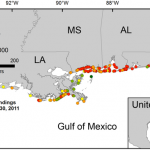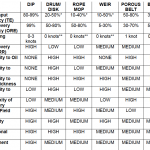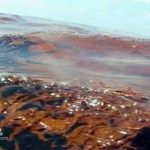Deepwater horizon
A higher than normal mortality rate for bottlenose dolphins (Tursiops truncatus) in the Gulf of Mexico during 2011 has been found to correspond with the Deepwater Horizon oil spill as well as colder weather conditions during 2010 leading to an influx of colder water into the Gulf from snowmelt. From January through April 2011, 186 bottlenose dolphins were found ashore between Louisiana and Florida, 46% of which were calves. This number is nearly twice that of preceding years (2003-2010). Using tissues collected from the animals, the actual cause of death is still under investigation.…
by Elizabeth Grossman
When the BP/Deepwater Horizon oil rig exploded on April 20, 2010, killing 11 of the 126 workers on board and critically injuring three, the ruptured Macondo well - located nearly a mile beneath the sea surface about 50 miles southeast of Venice, Louisiana - unleashed what has been called the largest accidental release of oil in history. By the time the well was capped on July 15th, an estimated five million barrels of oil had flowed into the Gulf of Mexico, affecting more than 350 miles of Gulf Coast, from Louisiana to Florida.
The clean-up response launched has also…
By Elizabeth Grossman
Since release of its Final Report to the President on January 11th, the National Oil Spill Commission has released five additional papers (called "working papers") reviewing aspects of the BP/Deepwater Horizon oil disaster - three on February 3rd and two on February 8th. On February 11th, National Oil Spill Commissioners Don Boesch and Terry Garcia testified before two House subcommittees. The final report, the working papers, and the Commissioners' prepared testimony all take a critical look at the industry's preparation for such a disaster, examine the policies and…
Several news outlets have reported that the commission appointed by President Obama to study the BP Deepwater Horizon oil spill has issued preliminary reports that are sharply critical of the Obama administration's handling of the disaster. I downloaded the commission's draft working paper "The Amount and Fate of the Oil" to see how they described the federal response.
The report doesn't paint a flattering picture of the Obama administration's approach to a scientific question of national importance.
The draft report is written by the commission staff, who recommend specific questions and…
Corexit was a big news topic at the beginning of this tragic Deepwater Horizon oil spill in the gulf of Mexico but it seems little talked about now.
There is no question that BP's calculation in its decision to use so much of this toxic chemical prioritizes the cosmetics of the situation over ecological impact and the health of cleanup crews. So much more important is PR that BP has not just refused to provide respirators to displaced fisherman labour crews, they threaten them with firing if they use their own!.
They don't care where the oil-dispersant mixture goes or what it harms as long…
We tend to give crakar a hard time around here, but via email he has offered us something for which we should all be grateful, and that is new hope for controlling the unfolding BP oil spill disaster in the Gulf of Mexico.
In the spirit of pictures being worth many words, I leave it at this:
[Update: BP has responded that according to their cost-benefit analysis, only one paper clip is indicated and it is their decision to go with that. "who cares, it's done, end of story, will probably be fine" said BP upper management.]
[Update 2: McGiver MacGyver has come out strongly against this new…
I am not an expert in oil field engineering. But I can smell bullshit. So I am sad to confess that at this moment I am putting more faith in an anonymous poster at the Oil Drum whom I have never heard of before than I am in any mainstream reporting I have come across.
His lengthy and compelling comment is here. What he says makes sense to my untrained ears and at the very least the "supplementary material" he links to is very informative.
The synopsis goes something like this (from memory):
the well is damaged below the sea floor
erosion from oil and gas flowing outside the well casing…
What happened at Three Mile Island in 1979 led to a new regulatory environment that increased the costs of building and running nuclear power reactors in the U.S. The environment was so hostile to the industry that no new reactors have been ordered since then. There are several in the planning stages, but none have been approved. The question now being debated among energy analysts is whether or not what's going on in the Gulf of Mexico at the moment will lead to similar challenges for the oil industry.
Of particular interest is the precedent set this week when BP agreed to pony up $20…
Oil supplies the United States with approximately 40% of its energy needs. Billions upon billions of gallons are pumped out of our wells, brought in from other countries, and shipped around to refineries all over the states. 1.3 million gallons of petroleum are spilled into U.S. waters from vessels and pipelines in a typical year. Yes, it would be great if we never spilled a drop of oil. No matter how hard we may try, though, the fact is that nobody is perfect, and oil spills are an inevitable consequence of our widespread use of oil. The question is, once the oil is out there, how do we…
I haven't been paying a great deal of attention to the actual *cause* of the oil leak, in the sense of whose *fault* it is (I mean, in the physical sense rather than any stupid legal sense). [[Deepwater Horizon oil spill#Investigations]] has some stuff. In fact I'll quote it, so we have a sort of agreed position to start from, if only to disagree with:
Attention has focused on the cementing procedure and the blowout preventer, which failed to fully engage.[216] A number of significant problems have been identified with the blowout preventer: There was a leak in the hydraulic system that…
tags: Graphic Depiction of Gulf Oil Spill, environment, infographic, Deepwater Horizon, BP, British PetroleumTransOcean
Below the fold (due to its large size) is an infographic depiction of the Gulf oil spill, including a timeline of the spill, the numbers of lives impacted, and last but not least, a graphic that compares this leak to others. You'll be astonished to see just how small this spill is compared to the Iraq war "spill" where more than 500 million gallons of oil were intentionally dumped into the environment. The scale of our greed is truly sickening.
Data sourced from BBC.…
tags: Care for Some Crude With Your Sushi?, toro sushi, maguro sushi, Atlantic Bluefin Tuna, Thunnus thynnus, Gulf of Mexico, pollution, oil spill, Deepwater Horizon, BP, British Petroleum, overfishing, endangered species, conservation, marine biology, streaming video
The Gulf of Mexico oil spill is the worst environmental disaster the US has faced. Toxic oil from the Deepwater Horizon well threatens the region's sensitive shorelines and the nesting birds along the Louisiana coast. But there's another species at serious risk: the Atlantic bluefin tuna, Thunnus thynnus. This disturbing video…
Definitely read the whole thing
More importantly, the two disasters are analogous in the unprecedented technical, administrative, and political challenges posed by their remediation. In the case of Chernobyl, the technical difficulty stemmed from the need to handle high level radioactive waste. Chunks of nuclear reactor fuel lay scattered around the ruin of the reactor building, and workers who picked them up using shovels and placed them in barrels received a lethal radiation dose in just minutes. To douse the fire still burning within the molten reactor core, bags of sand and boron were…
So, at a Sunday news briefing, British Petroleum's CEO, Tony Hayward, announced that there are no underwater plumes of oil resulting from the April accident at the company's Deepwater Horizon rig in the Gulf of Mexico.
Why? Well, first BP's testing hasn't found any such evidence. And second, Hayward reminds us that, you know, oil floats. Or if we didn't get that: "Oil has a specific gravity that's about half that of water. It wants to get to the surface because of the difference in specific gravity."
Let's give the man this: there is definitely oil floating on the surface…
There remain more questions than answers at this point, but the BP spin from yesterday that "Top Kill" was working appears to have been a falsehood. BP is not the right source for what the actual data from the well head means, but unfortunately they are the only source of said data.
I would like to offer interested readers a couple of better sources of technical information.
This is the live feed from 5000 ft below the Gulf of Mexico.
Apparently what this is showing now (11:02 AM Pacific time) is alot of drilling mud being ejected. This mud is what is intended to counteract the upward…
Let's start with some slightly, okay, more than slightly depressing numbers: Since the devastating explosion on BP's Deepwater Horizon rig almost three weeks ago, more than 1.7 million gallons of oil have spilled into the Gulf of Mexico and more than 250,000 gallons of chemical dispersant have been sprayed onto that spill in an effort to contain the damage.
Everyone agrees that it's the enormous slick of oil that we should really worry. But in the last week, questions have also been raised about the cleaning chemicals flooding into the Gulf. Although the amount pales, as they say,…
The estimates of the just how much oil is spewing into the Gulf of Mexico from BP's Deepwater Horizon rig keep rising. The latest guess -- and it is just a guess -- is something like 210,000 gallons a day. It is almost certainly going to eclipse the Exxon Valdez catastrophe by the time things are brought under control. Who knows how much damage has been done to the Gulf Coast ecology and economy? But could it be that we're lucky this happened where and when it did, instead of a few years down the road in an even more difficult spot, say the Arctic Ocean?
Canada has long been interested in…




